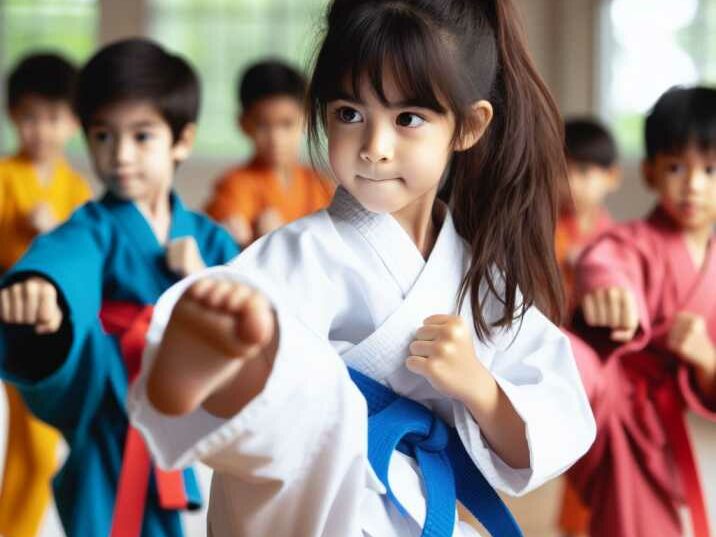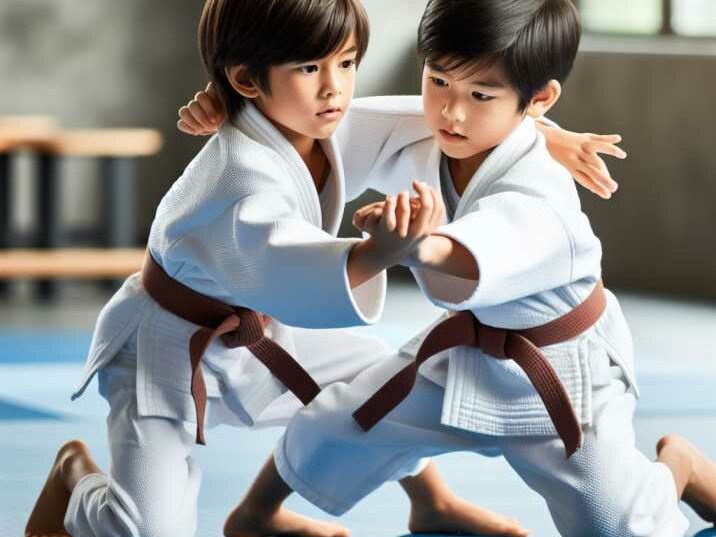Introduction:
Table of Contents
In today’s world, where children face various challenges, equipping them with self-defense skills is paramount. Self-defense martial arts offer more than just physical techniques; they foster discipline, confidence, and resilience. This guide explores the top self-defense martial arts for kids, their benefits, and key considerations for parents when choosing the right martial art for their child.

Why Choose Self-Defense Martial Arts for Kids?
Self-defense martial arts empower children with invaluable skills to protect themselves and navigate adversities confidently. These practices instill discipline, focus, and self-confidence, essential for personal development and safety.
Exploring the Top Self-Defense Martial Arts for Kids:
Karate:
Known for its striking techniques, Karate emphasizes self-discipline and respect. It promotes physical fitness and mental well-being while teaching children effective self-defense skills.
Benefits of Karate for Kids:
- Improves strength, coordination, and flexibility.
- Enhances focus and mental discipline through forms training.
- Instills self-confidence and teaches goal setting through belt progression.
- Offers a structured environment that promotes respect and self-control.
Taekwondo:
Taekwondo’s dynamic kicking techniques improve flexibility and agility. Rooted in Korean tradition, it teaches self-control and perseverance alongside self-defense techniques.
Benefits of Taekwondo for kids:
- Strong Kicks & Core: Makes them powerful and coordinated.
- Move Like a Ninja: Improves flexibility and agility.
- Respect & Discipline: Teaches them good manners and focus through belt ranks.
- Fun & Energetic: Keeps them active and engaged in a positive environment.
Brazilian Jiu-Jitsu:
With a focus on ground fighting and leverage, Brazilian Jiu-Jitsu enables children to defend themselves against larger opponents effectively. It emphasizes technique over strength, promoting confidence and problem-solving skills.
Benefits of Brazilian Jiu-Jitsu for Kids:
- Teaches effective self-defense from a ground position.
- Develops problem-solving skills and strategic thinking.
- Enhances flexibility and overall strength.
- Promotes a sense of calm and control in stressful situations.
Judo:
Judo‘s emphasis on throws and grappling techniques enhances balance, coordination, and self-defense abilities. Children learn to utilize an opponent’s energy, making it suitable for kids of all sizes.
Benefits of Judo for Kids:
- Develops coordination, balance, and spatial awareness.
- Teaches safe falling techniques to minimize injury risk.
- Promotes self-control and respect for opponents.
- Offers a competitive outlet for energetic children.

Krav Maga:
A practical self-defense system, Krav Maga teaches children to neutralize threats efficiently. Originating from Israel, it emphasizes real-world scenarios and situational awareness, preparing kids for common attacks.
Benefits of Krav Maga for Kids:
- Self-Defense Powerhouse: Focuses on real-world attacks, teaching practical techniques to defend yourself.
- Learn Fast: Uses natural reflexes for quicker learning of self-defense skills.
- Be Prepared: Teaches how to spot threats and avoid trouble before it starts.
- Get Fit: Intense workouts build strength, endurance, and overall fitness.
- Confidence Boost: Mastering self-defense empowers you to handle tough situations.
Choosing the Right Martial Art for Your Child:
Consider your child’s personality, interests, and physical abilities when selecting a martial art. Visit local dojos, observe classes, and communicate with instructors to find the best fit. Encourage consistent practice and support your child’s journey with praise and positivity.
Benefits of Self-Defense Martial Arts for Kids:
- Improved physical fitness and coordination
- Increased self-confidence and self-esteem
- Enhanced focus and concentration
- Discipline and respect for others
- Stress relief and emotional well-being
- Lifelong friendships and community bonds
Tips for Parents:
- Encourage regular attendance and practice
- Support and praise your child’s efforts and achievements
- Communicate with instructors about concerns and goals
- Lead by example with respect and discipline
- Reinforce the importance of self-defense skills without instilling fear
Table of Information about self-defense martial arts for kids:
| Topic | Details |
|---|---|
| Introduction | Importance of self-defense martial arts for kids |
| Why Choose Self-Defense Martial Arts for Kids | Empowerment, safety, discipline, focus, confidence |
| Top Self-Defense Martial Arts for Kids | Description and key features of Karate, Taekwondo, Brazilian Jiu-Jitsu, Judo, Krav Maga |
| Choosing the Right Martial Art for Your Child | Considerations: personality, interests, physical abilities, instructor interaction |
| Benefits of Self-Defense Martial Arts for Kids | Improved fitness, confidence, focus, discipline, stress relief, friendships |
| Tips for Parents | Encourage practice, support, communication with instructors, lead by example |
| Conclusion | Recap of benefits of self-defense martial arts for kids |
Conclusion:
Investing in your child’s safety and well-being through self-defense martial arts for kids is a decision that yields lifelong benefits. Whether they choose Karate, Taekwondo, Brazilian Jiu-Jitsu, Judo, or Krav Maga, the skills and lessons learned extend far beyond the dojo, preparing them to face life’s challenges with confidence and resilience.
FAQs:
Which martial art is best for kids?
Each martial art offers unique benefits. Karate and Taekwondo focus on striking techniques, while Brazilian Jiu-Jitsu and Judo emphasize grappling. Krav Maga is renowned for its practical self-defense techniques.
At what age can kids start learning martial arts?
Many martial arts schools accept children as young as four or five years old, but the ideal age can vary depending on the child’s maturity and attention span.
How often should kids practice martial arts?
Consistency is key. Most martial arts schools recommend attending classes at least two to three times per week to see progress and retain skills.
Will learning martial arts make my child more aggressive?
No, quite the opposite. Martial arts promote self-discipline, respect, and control, which can help children manage their emotions and avoid conflicts.
Can children compete in martial arts tournaments?
Yes, many martial arts offer opportunities for children to compete in tournaments at local, regional, and national levels, fostering healthy competition and sportsmanship.


